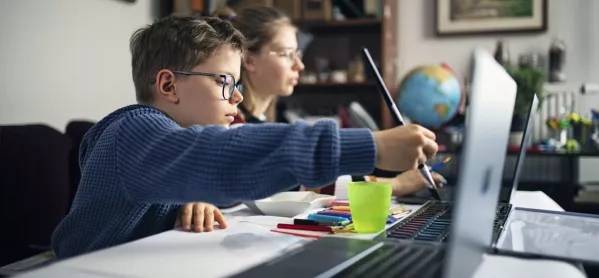Remote learning produces results equal to or better than traditional teaching methods, research suggests.
Most meta-analyses focused on remote learning approaches found the results to be “either higher or the same as traditional instruction”, according to a new report from the Education Endowment Foundation (EEF).
The “rapid evidence assessment” of remote learning, conducted in light of the coronavirus crisis, summarised the findings from 60 systematic reviews and meta-analyses under five key topic areas: general remote teaching and learning; blended learning; computer-supported collaborative learning; computer-assisted instruction; and educational games.
Coronavirus: Free laptops for disadvantaged pupils
DfE: Williamson backs national online academy
Exclusive: National edtech hub ‘needed to close gap’
While the study did “not attempt to measure the impact of distance learning overall”, the report says: “There is evidence that remote learning can have positive impacts on learner outcomes - most meta-analyses conducted on remote learning approaches found results to be either higher or the same as traditional instruction.”
Coronavirus: Will remote learning affect pupils?
The EEF report also says that the quality of remote teaching is more important than how lessons are delivered.
This means that livestreaming lessons is not necessarily more effective than sharing prerecorded videos, and vice versa.
The report adds: “What matters most is whether the explanation builds clearly on pupils’ prior learning or how pupils’ understanding is subsequently assessed.”
However, is also states: “It is important to note the limitations of applying existing evidence to school shutdowns due to Covid-19. None of the studies examined measure impacts on learning during a global pandemic, and there are characteristics of the current situation that will be unique, including due the demands of parents working from home, staff illness and other restrictions related to social distancing.”
But Nansi Ellis, assistant general secretary for education policy and research at the NEU teaching union, said: “Teachers know that even in the best classrooms, building lessons on pupils’ prior learning doesn’t always mean that pupils engage and learn.”
She added: “Some pupils will need much more individual support than is possible [with remote learning], and many will need support for their wellbeing before any meaningful learning can take place. Teachers, too, are in difficult circumstances, caring for their own children and supporting other family members.”
The report says that “more research is needed” to determine if remote learning approaches are likely to widen the attainment gap.
However, the study found that several studies have identified access to technology as an “important barrier” to implementing distance learning.
“If school- or pupil-level disadvantage means that pupils do not have access to the technology needed to engage with remote learning, this is likely to cause attainment gaps to widen,” the report says.
Ms Ellis added: “It is true that this pandemic is likely to cause the most disruption to those pupils already disadvantaged.
“School closure will exacerbate this, but so will parental job losses and money worries, increased poverty and housing insecurity, bereavements, loss of time spent with friends and other family members, and the huge anxiety that pupils and parents will be feeling.
“Providing online teaching now or catch-up classes later will not solve any of those problems.”
Geoff Barton, general secretary of the Association of School and College Leaders, added: “The biggest challenge is the digital divide between rich and poor children, which leaves a significant number of young people from disadvantaged homes unable to access online resources.”




